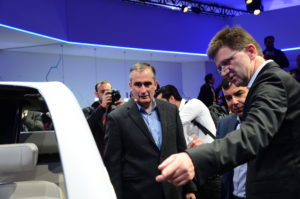
Intel: $15.3B deal for Mobileye means self-driving car’s ‘intelligent brain’ buys its ‘intelligent eyes’
By onAnnouncements | Business Practices | Market Trends | Technology
In a major development for the partially and completely self-driving cars poised to slash collision volume, Intel has agreed to pay up to $15.3 billion for Mobileye.
Intel, you likely know from your home PC’s sticker: The guys who make the central processing units that allow computers to exercise basic and now increasingly advanced artificial intelligence. Mobileye might be less familiar, but they’re a hot name in self-driving cars that among other highlights last year partnered with BMW (and Intel!) on the technology and had what Bloomberg reported was a nasty breakup with Tesla regarding Autopilot. They’ve developed systems which allow self-driving cars to figure out just what it is they’re seeing in forward-facing cameras and alert drivers accordingly.
“This acquisition is a great step forward for our shareholders, the automotive industry and consumers,” Intel CEO Brian Krzanich said in a statement. “Intel provides critical foundational technologies for autonomous driving including plotting the car’s path and making real-time driving decisions. Mobileye brings the industry’s best automotive-grade computer vision and strong momentum with automakers and suppliers. Together, we can accelerate the future of autonomous driving with improved performance in a cloud-to-car solution at a lower cost for automakers.”
Intel will pay $63.54 in cash per share for Mobileye for what the chip manufacturer said was “a fully-diluted equity value of approximately $15.3 billion and an enterprise value of $14.7 billion.”
“The acquisition of Mobileye brings together the assets of Intel’s Xeon processors, FPGAs, 3D XPoint memory, and 5G modems with the world leader in automotive computer vision,” Krzanich wrote to his employees. “This acquisition essentially merges the intelligent eyes of the autonomous car with the intelligent brain that actually drives the car.”
Interestingly, unlike other companies who talk about “mobility” or “zero fatalities,” Intel indicated it cared about self-driving cars more for the information they generate.
“Many of you have asked why we think autonomous cars and vehicles are so important to Intel’s future,” Krazanich wrote. “The answer is DATA. Our strategy is to make Intel the driving force of the data revolution across every technology and every industry. We are a DATA company. The businesses we focus on, and deliver solutions to, create, use and analyze massive amounts of data. …
“At four terabytes of data per day, the average autonomous car will put out the data equivalent of approximately 3,000 people. Put just one million autonomous vehicles on the road and you have the data equivalent of half the world’s population. This massive amount of data requires all of Intel’s assets to provide the cost-effective high-performance solutions our customers need. The addition of Mobileye to our family provides the data path to our computing solutions becoming the intelligent set of eyes that will allow a vehicle to see and define the world around it.” (Emphasis Krzanich’s.)
On the whole, Intel projected a “vehicle systems, data and services market opportunity” that could reach $70 billion by 2030.
Mobileye spoke about the benefit to society.
“We expect the growth towards autonomous driving to be transformative. It will provide consumers with safer, more flexible, and less costly transportation options, and provide incremental business model opportunities for our automaker customers,” Mobileye CEO Ziv Aviram said in a statement. “By pooling together our infrastructure and resources, we can enhance and accelerate our combined know-how in the areas of mapping, virtual driving, simulators, development tool chains, hardware, data centers and high-performance computing platforms. Together, we will provide an attractive value proposition for the automotive industry.”
It also cited the intense self-driving car competition as a reason to team up with Intel.
“Naturally, this transition introduces execution risks as we need to master new skills yet the window of time for meeting our objectives is very limited given the competitive environment and that new players are attempting to enter the market,” Aviram and Chief Technology Officer Amnon Shashua wrote to employees. “The transaction with Intel provides a huge opportunity to leverage each other’s strengths and move faster towards our long term vision.”
More information:
Intel Mobileye purchase webpage
Intel, March 13, 2017
Mobileye, March 13, 2017
Intel and Mobileye, March 13, 2017
Featured image: From left, Intel CEO Brian Krzanich, Mobileye Chief Technology Officer Amnon Shashua and Klaus Fröhlich of BMW are seen with a BMW prototype ahead of the 2017 Consumer Electronics Show. (Walden Kirsch/Intel)
